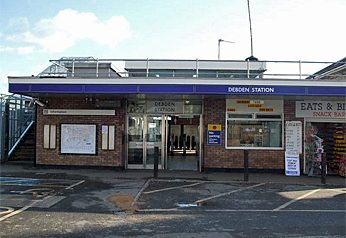The station was originally opened on 24 April 1865 by the Great Eastern Railway as part of an extension of the railway's Loughton branch to Epping and Ongar. Initially called Chigwell Road, it was soon renamed on 1 December 1865 as Chigwell Lane, but remained a single-platform halt for the first years of its life. It was the setting for the Victorian ballad The Chigwell Stationmaster's Wife, Chigwell station not having opened until 1903. Steam services were replaced by electric Central line passenger services on 25 September 1949. From the handover, the station was renamed Debden. The name (Deppendana in the Domesday Book) is derived from the Old English dep, 'deep' and den, 'valley'. Debden originated as a manor of 40 acres (160,000 m2) in the Ongar hundred of Essex. The manor became the property of Waltham Abbey in 1086. By about 1254 the manor of Loughton had absorbed Debden. Following the Dissolution of the Monasteries in 1540 the manor passed to the king and later to private owners.
Debden station operates as an intermediate terminus for eastbound trains from central London, and a number of peak-hours trains terminate at the station rather than continuing to Epping. A turnback siding east of the station allows eastbound trains terminating at Debden to reverse direction and enter the westbound platform to return to central London. The station has payphones, toilets, a bridge, waiting room and car park.
Connections: Local bus routes 20 and 167 (The Broadway) and 397 (Rectory Lane) serve Debden a short walk away.


